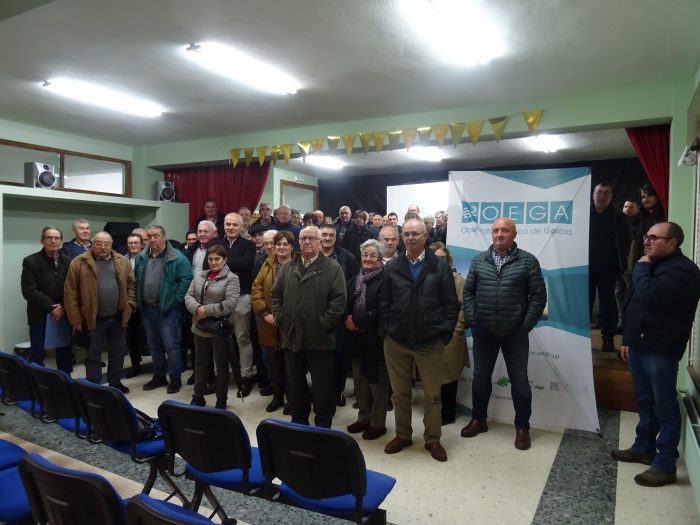
-
Facultade de Económicas
Universidade de Vigo
-
observatorio.eolico@uvigo.gal
-
Multinational Proposes Wind Farm with Housing within 500 Meters of Wind Turbines
- Home
- Wind Energy in Galicia
- Multinational Proposes Wind Farm with Housing within 500 Meters of Wind Turbines

- by OEGA
- 0 Comments
The Santuario wind farm, currently undergoing administrative authorization by the Spanish government, allegedly has a design that contradicts the law regulating energy exploitation in Galicia. The project is promoted by the Italian multinational ENEL, formerly the Spanish public company Endesa.
Xermade already has involvement in three wind farms: Caballeira, Goia Peñote, and Sotavento, totaling almost 35 MW spread across 43 wind turbines. Except for a 2 MW turbine installed in 2005 in Goia Peñote, the rest of the wind turbines are less than 0.8 MW. This is in stark contrast to what is proposed in Santuario: 23 wind turbines with a 7 MW individual capacity, reaching a total of 161 MW, nearly five times the capacity already installed in Xermade in those three parks (also located in Muras, Vilalba, Monfero, and As Pontes de García Rodríguez).
The dimensions of the existing wind farms and the prospective Santuario are not comparable in terms of technology, economics, and the environment. The increase in the size of the wind turbines would be accompanied by greater productivity, production, and revenue. If, before 2021, the wind farms in Xermade generated around 6 million euros annually, reaching 12 million in 2022, and if the electricity from Santuario were sold at the average price of 2020, the revenue would be 25.5 million annually. If the price were that of 2022, the revenue would reach almost 85 million, and with the average price of November 2023, it would be close to 40 million annually. The estimated investment is nearly 170 million. For a park with a projected lifespan of 25 years, swift and straightforward calculations would aid in assessing the business scale linked to this venture. If this had occurred in the Netherlands, the company would be obligated to make up to 50% of the park’s ownership available to the local community. It seems obvious that with a Dutch-style model, the economic impact on rural Chairego would be of a completely different nature and magnitude.
Moreover, the local communities’ social perception of the wind farm may differ, a recurring theme in all transparency initiatives conducted by the GWO is illustrated by statements such as: “We only own the land to pay taxes” as expressed by a woman who attended last week’s discussion. Another resident voiced a similar sentiment: “They intend to install a wind turbine just 250 meters from my residence. I pay taxes like any citizen, my house has municipal approval, and my family has lived there for generations. How can they position a 200-meter structure so close to my home?” The following images provide several examples illustrating this concern.
Territorial Impact of Santuario
In addition to these effects and social impressions, the Santuario wind farm would have a significant territorial impact. This impact would have two effects: first, a change in urban classification and, therefore, a change in the utilization conditions that landowners would have for those lands. Rural property would lose options for building and utilization on around 350 hectares. Secondly, the application of Article 31 and Transitional Provision 6 of Law 8/2009, which regulates territorial and energy planning in Galicia, with an impact on the authorization process of this park despite being subject to approval by the Spanish government, would mean that almost 8,300 hectares of Xermade, Guitiriz, Monfero, and Vilalba would remain permanently under ENEL’s control regarding future wind farms, even those proposed by the municipality or local rural communities. The question posed by the GWO to the attending public was whether they thought ENEL would pay for all these effects. The unanimous response was a resounding NO that echoed in that room full of Xermade residents.

Conclusion
The Xermade community, led by its mayor, Roberto García Pernas, who was present at the informational meeting held at the Plurilingual CEIP of Xermade, was very categorical in stating that they are not against wind energy and are aware of what it means to produce emissions-free electricity. However, they reject any attempt that would infringe upon the basic rights of rural inhabitants. In the words of the mayor, “the people of Xermade do not deserve to bear the costs of wind energy while others, in this case, an Italian company, would take the whole pie; here, they leave us with the disadvantages, and they take the money. This cannot be tolerated.”







